The Moon Over Mtatsminda
The Global Research Institute’s Summer Fellows Program provides international experiential learning opportunities to W&M students. This post is one installment of a series highlighting the 2022 Fellows’ key discoveries and formative experiences.
By Daniella Marx ’24
I arrived in Georgia on May 26th which coincided with the Georgian Independence Day. As soon as Katrine and Abby, two of the other GRI summer fellows, let me know that there was a major celebration taking place, I was determined to join them, even if I felt dulled by jet lag and mild sleep deprivation. It was a great choice — the rally and ensuing festivities, the tanks, the jets flying overhead, and the sea of innumerable red and white flags all acutely stand out in my memory. I was thrilled to witness an event so animated and deeply tied to the work we would engage in over the next few weeks.
Our lives in Georgia would become incredibly eventful, especially after the last two fellows, Aliia and Maia, arrived. Our research on Georgian military involvement in Afghanistan and Iraq couldn’t have been conducted at a better time: It was the summer of budding hope for Georgians, as they anticipated they would receive EU candidacy after two decades of sweeping reforms. Additionally, the demographic makeup of Georgia was dramatically diversifying before our eyes, as thousands of Russians and Ukrainians poured into the country. Lastly, the United States’ withdrawal from Afghanistan raised many unanswered questions from the thousands of Georgians who served, as well as concerns over the future of the US-Georgia military relationship. These shifting domestic and international issues would ground our research in the uncertain present day. Frequently, we would encounter the ramifications of these changes on the streets: animated demonstrations, marches, and the organizing of transnational activist networks that seized this contextual momentum to further political progress in Georgia.
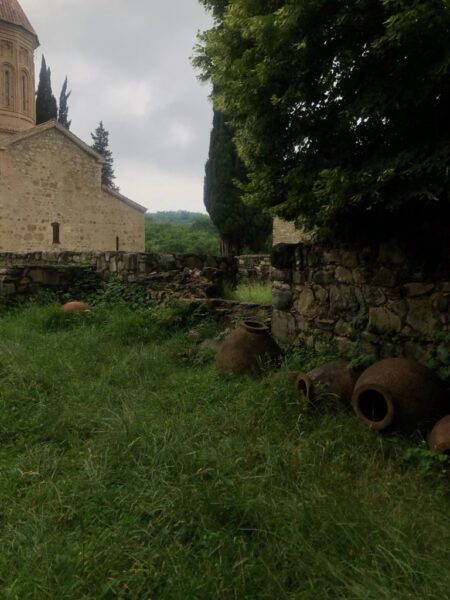
A row of ancient kvevri at the Ikalto Monastery. Long ago, when travelers visited institutions and religious sites, they would leave kvevri as a traditional gift. The Ikalto Monastery is legendary for being one of the institutions where the great Georgian national poet Shota Rustaveli is said to have studied.
It seemed that there was nearly always some new contact, invitation, or outing in the immediate future — really, a daily flurry of activity. Between seeking out contacts, interviewing, typing up and reviewing notes, and our unexpected but memorable work at a Georgian think tank, we were immersed. Looking back, I’m amazed at how much we accomplished. Even beyond our primary research goals, we helped to write and edit multiple grant proposals, engaged in individual projects, and acquainted ourselves with a vast network of Georgian professionals, academics, and politicians. I am most proud of our work with the Georgian think tank, where we helped develop and fund a program to empower and better educate women in South Ossetia and Abkhazia. Four of us were offered positions at the think tank through a chance meeting. Our job also gave us a chance to befriend Georgians who were also in college, meet several former diplomats, and even snack on hors d’oeuvres with the then-Turkish ambassador to Georgia.
Our weekends, when not spent unwinding from the working week’s affairs, were full of adventure. One weekend led us to the rolling hills, immaculate vineyards, and terracotta kvevris of Georgia’s Kakheti region. There, we explored and met the feline residents of a highly esteemed medieval academy, as well as visited multiple monasteries and religious sites. On another weekend, Maia, Aliia and I went to Gori, where we peered into Stalin’s home, met a lot of interesting people, and picked fresh fruits.
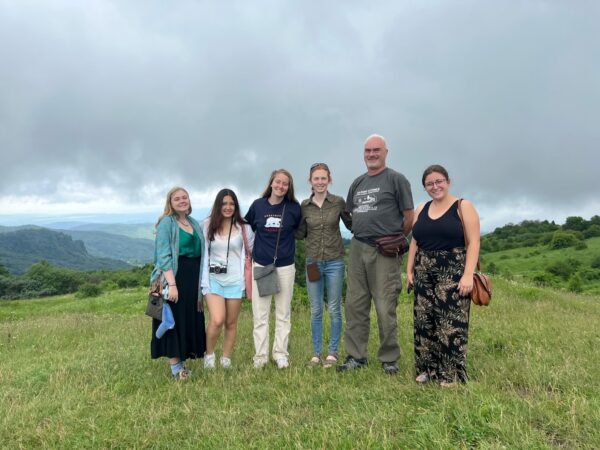
The fellows and a friend posed by the Caucasus mountain range outside of Tbilisi, near the Kakheti region. The mountainous region is known for its monasteries, archeological sites, and vineyards. The region’s administrative capital, Telavi, is home to Georgia’s biggest 900-year-old tree.
One of my favorite days in Georgia was when Katrine, Abby, Aliia and I endeavored to summit Tbilisi’s Mount Mtatsminda — “Holy Mountain.” That mountain, which towers over the city of Tbilisi, had been a fixation of mine during free-time: I had picked up a Russian translation of the Georgian poet Galaktion Tabidze’s The Moon Over Mtatsminda at a book stand near my and Aliia’s apartment.
A bookseller, who I would later become quite familiar with, noticed me indecisively poring over his eclectic array of Russian and Georgian language books and asked me where I was from. I told him that I was from the United States and that I studied Russian at college. He swiftly recommended to me a collection of the Russian poet Akhamotva’s poems. Unbeknownst to him, Akhamatova is generously represented within Swem Library’s labyrinths. I asked if he could instead recommend a famous Georgian writer. And so, he introduced me to Galaktion Tabidze.
As I would descend deeper into Tabidze’s literary corpus, which was often centered on themes of nature and Georgian cultural identity, I would increasingly find myself looking to the natural world for inspiration.
While in Georgia, I marveled at how nature represented itself in ways I’d never noticed before: the nighttime sky, especially on nights when I would observe heat lightning and fireworks; the cool spring water that trickled down from a cliffside; or freshly picked cherries in Gori. Representations of nature in visual art were another inspiration: I developed an intense craving for pomegranates after seeing so many sculptures, paintings, and magnets depicting the fruit.
Creative works in Georgia also dealt with serious matters, which were grounded in both modern and historical struggles, sharing narratives and perspectives that could otherwise go unsaid. These stories were all around us: widespread graffiti that expressed sentiments (both positive and negative) on integration with NATO and the EU. In conversations, our team would share stories or photos of graffiti that had really struck us. Acquaintances would show off newly inked, pro-Ukrainian, and anti-war tattoos. Even today, I often think about a collection of gripping postmodern paintings I once saw, which brought to mind Svetlana Alexievich’s Zinky Boys, a collection of Soviet war testimonies. Art, in all its forms, communicated narratives that were immensely relevant to our research and understanding of Georgian culture.
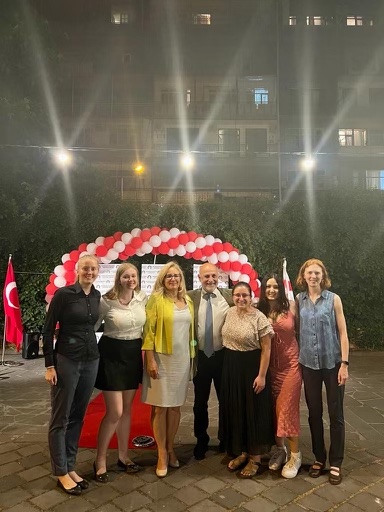
Georgia fellows with the Turkish Ambasador to Georgia, as well as a colleague from the Georgian Strategic Analysis Center (GSAC). We attended her farewell party in the GSAC courtyard, as she was finishing up her tenure as ambassador.
By working, socializing, and exploring within Georgia, we Fellows were able to expose ourselves to unexpected new ideas, experiences, and contexts. I even managed to learn a new alphabet while I was there. I am glad to have worked alongside such a skilled and talented cohort during such a pivotal time in Georgia’s modern history. I’m thrilled to share that we’ve been able to bring back and implement some of our insights through continued research with our mentor, Professor Maliniak, that focuses on political issues in the Caucasus. By engaging in this work even when on campus, our ties to this beautiful and energizing country can be strengthened, drawing us all closer to friends and memories made.

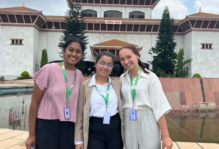
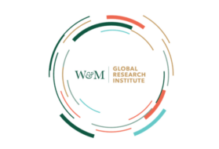
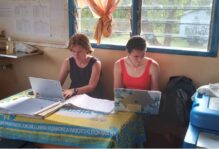
No comments.
Comments are currently closed. Comments are closed on all posts older than one year, and for those in our archive.